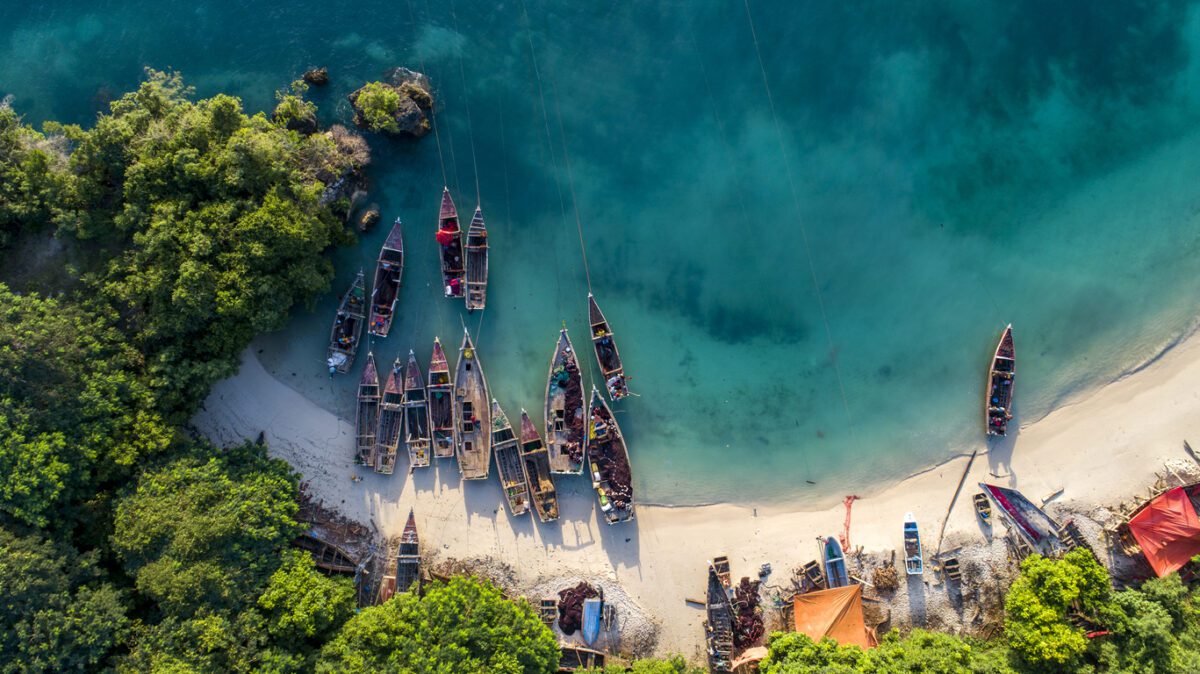Climate change is raising global temperatures and threatening ecosystems worldwide. To meet the Paris Agreement goals (keeping warming under 2°C), people everywhere must take action, including reforesting degraded lands.
Trees and forests in Africa store carbon, protect watersheds and habitats, and help communities adapt. A growing number of volunteer travel programs now focus on tree-planting and ecological restoration. By volunteering in Africa, you can see countries like Kenya, Tanzania, Ghana, South Africa, and Madagascar while actively fighting climate change.
Most Popular Guidebooks
International Volunteer HQ (IVHQ)
International Volunteer HQ (IVHQ) runs several tree-planting and conservation programs in Africa.
In Malawi, the Environmental Conservation project has volunteers planting trees in rural villages and tending local tree nurseries to restore forest cover. Participants also work with schools and communities on recycling and sustainable agriculture.
In Zanzibar (Tanzania), IVHQ’s Rainforest & Coastal Conservation project immerses volunteers in Jozani Forest. Volunteers there help plant and protect mangrove trees, care for reptiles and birds, and teach environmental education in local schools.
These programs are designed to rebuild habitats and empower local people. For instance, IVHQ notes that its Malawi project “includes initiatives like tree planting in the local village, community tree nursery work and workshops on sustainable practices”.
GoEco
GoEco offers affordable reforestation programs in East Africa. One flagship project is the Kilimanjaro Reforestation & Conservation trip in Moshi, Tanzania. Volunteers at this program plant indigenous tree species to combat deforestation and protect water sources, and maintain a botanical garden of native plants.
Other activities include sustainable farming projects and renewable-energy workshops – for example, producing biodiesel from local seeds and building aquaponics systems for fish and vegetables. Participants also help teach conservation to schoolchildren. Key volunteer tasks in this GoEco program include:
- Planting native trees and tending tree nurseries in the Kilimanjaro region.
- Sustainable agriculture: helping in vegetable gardens and permaculture sites.
- Learning crafts and eco-skills: making compost, producing natural dyes, and even making biodiesel from Jatropha seeds.
African Impact
African Impact specializes in volunteer projects on the continent, including dedicated reforestation programs. Their Reforestation & Environmental project in Limuru, Kenya is a prime example.
Here, volunteers work to conserve indigenous Kenyan forests by removing invasive plant species, collecting native tree seeds, and maintaining forest trails. They also engage in youth outreach: educating local schoolchildren about environmentalism. Key activities include:
- Forest conservation: clearing non-native plants and propagating native seeds to restore forest areas.
- Tree planting: helping plant native seedlings to expand forest cover and reduce erosion.
- Community sustainability: assisting villagers to build rainwater harvesting systems and organic gardens.
African Impact notes that volunteers join women’s groups and school programs as part of these projects. This holistic approach not only replaces lost trees but also empowers communities with sustainable practices.
Involvement Volunteers International (IVI)
Involvement Volunteers International (IVI) is a well-established Australian non‑profit (founded in 1989) that delivers affordable, grassroots-focused volunteering.
IVI offers a range of eco-projects that reinvest fees directly into local communities.
- Forest & Mangrove Conservation (Madagascar – Nosy Komba)
Volunteers work amid lush island forests and mangrove wetlands, planting native tree species, caring for seedlings, and supporting turtle and marine habitat programs. These efforts protect biodiversity hotspots and strengthen coastal ecosystems against erosion and climate impacts. - Environmental Conservation (Kenya – Nakuru & Kakuma Refugee Camp)
In Nakuru, volunteers engage in tree nursery care, plant indigenous seedlings and adult trees, and lead local workshops on climate awareness and recycling. At Kakuma Camp, the focus expands to include planting fast-growing trees for firewood, boosting waste management systems, and delivering outreach on sustainable living for refugee communities. - Agroforestry & Conservation Farming (Tanzania – Arusha & coastal regions)
These projects blend tree planting with sustainable agriculture, promoting soil regeneration, food security, and agroforestry systems that help mitigate carbon emissions.
All initiatives are community-centred, affordable, and structured so that volunteer fees fuel local benefits directly.
Volunteering Solutions (VolSol)
Volunteering Solutions (VolSol) offers affordable volunteer opportunities across 25+ countries, including key destinations in Africa.
- Forest Conservation in Madagascar
Based on Nosy Komba island, volunteers assist in regenerating rainforests and protecting wildlife habitats. Activities include species identification, maintaining seedling nurseries, conducting biodiversity surveys, and supporting turtle and bird monitoring. Training is provided to develop field research and ecological restoration skills. - Coral & Sea Turtle Conservation in Tanzania
In the coastal region of Mtwara/Mikindani, VolSol’s marine conservation project focuses on coral reef restoration and sea turtle protection. Volunteers help create and deploy coral structures, map reefs and turtle populations, relocate turtle nests from poaching zones, and engage in educational outreach within local communities and schools. Longer placements include optional Reef Guru coral-restoration certification.
VolSol emphasizes impactful, budget-friendly experiences with meaningful contributions, placing over 25,000 volunteers globally, many in eco-projects.
Global Vision International (GVI)
Global Vision International (GVI) is renowned for its high-impact conservation and climate action programs across the globe.
In Africa, GVI often partners with national parks, marine authorities, and research institutions.
- Coral Reef Ecology & Conservation (Seychelles – Mahé Island): Volunteers dive into critical coral reef restoration, earning PADI Advanced Open Water and Reef Ecosystem Diver (RESD) certifications while:
- Conducting coral reef surveys and bleaching impact assessments
- Building and maintaining coral nurseries and transplanting mature corals
- Collecting data to support Seychelles Parks & Gardens Authority management strategies for reef recovery.
- Climate Change & Coral Bleaching Study (Seychelles): In this program, you’ll gather data on coral bleaching events, assist with reef rehabilitation, and learn about mitigation strategies in response to rising ocean temperatures — again with PADI certification available.
- Island Conservation Expedition (Seychelles): This multi-disciplinary program includes: conducting biodiversity surveys of mangroves, birds, turtles, crabs, and invasive species; snorkeling reef habitats; beach cleanup and profiling; and supporting environmental education for coastal communities.
By joining a GVI eco-program, you’ll engage in hands-on conservation and make a lasting climate impact with scientific rigor and community empowerment.
Get Involved!
Each of these providers links its program page above, where you can find dates, fees, and volunteer experiences. Whether you choose IVHQ’s tree-planting in Malawi, GoEco’s farming and forestry in Tanzania, African Impact’s forest project in Kenya, or any other eco-program, you’ll play a direct role in climate action. These projects not only “combat climate change and assist with global reforestation”, but also support local communities in Africa’s Kenya, Tanzania, Ghana, South Africa, Madagascar, and beyond.
By volunteering abroad on a reforestation or ecological project, you help build a greener future for the planet – one tree at a time.


Munira Maricar · Travel Writer
With an international living background spanning Singapore, Qatar, Japan, and Mexico, Munira enjoys sharing insights on immersive travel while emphasizing the vital role of cultural respect and ethical engagement. Her extensive experience offers a unique perspective that inspires others to explore the world through service, ensuring that every journey respects and contributes positively to local traditions and communities.